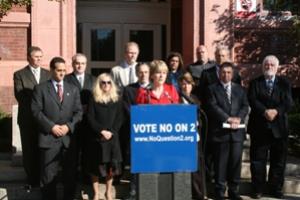Anti-medical marijuana crusader San Diego DA Bonnie Dumanis finally got a conviction in a dispensary case, but only after a sympathetic judge refused to let the defendant mention medical marijuana.
Massachusetts activists used non-binding public policy questions to successfully build support for decriminalization. Now, they're doing the same thing with medical marijuana and legalization.
The latest Field poll has Prop 19 leading 49% to 42%. That's a dramatic reversal from July, when it trailed 44% to 48%. Is victory within grasp?
Yet another unarmed person shot in a drug raid, this one very, very pregnant. Reports say the injuries were not life-threatening. Let's hope they stay that way.
Add another voice to the growing anti-prohibitionist chorus: Spain's former drug czar has come out for drug legalization.
Two mayors were among the dead in Mexico's prohibition-related violence this past week. That makes five this year.
A massively crooked sheriff, a massively enraged DEA agent, a couple of greedy cops, and a woman police officer married to the wrong guy all made the news this week.
Drug prohibition costs Washington and the states $88 billion a year in law enforcement costs and lost tax revenues, Harvard economist Jeffrey Miron reports.
The Oregon Cannabis Tax Act initiative campaign is already gearing up for 2012, but if one legislator has his way, Oregon won't have to wait that long.
Massachusettts decriminalized in 2008. Now, Democratic gubernatorial nominees in two neighboring states are saying they want it, too.
Events and quotes of note from this week's drug policy events of years past.
The second time was the charm for anti-medical marijuana San Diego District Attorney Bonnie Dumanis. Last year, she failed to convict San Diego medical marijuana dispensary operator Jovan Jackson on distribution charges. But on Tuesday, after Dumanis convinced the trial judge to not allow Jackson to mention medical marijuana in his defense, a state court jury found him guilty of three counts of marijuana possession and distribution.

Jovan Jackson
Jackson's attorney announced Wednesday that he will appeal the decision. It is about time for a state appellate court to clear up some of the confusion around the state's medical marijuana Compassionate Use Act, said Dale Gieringer, head of
California NORML.
"The verdict doesn't surprise me since they rigged the trial," said Gieringer. "It will be appealed, and it's probably a good appellate case. I think it's time for an appellate court decision on all this, or a new law to clarify the legality of marijuana distribution. Until we change the law, we have to rely on the courts."
"By refusing him a defense, the district attorney and the court have railroaded Jackson and ensured his conviction," said
Americans for Safe Access (ASA) chief counsel Joe Elford, who submitted an amicus brief in support of Jackson prior to his trial. "Jackson was denied a fair trial," Elford continued. "His conviction and the basis on which the court relied in refusing him a defense -- that sales are illegal under state law -- should absolutely be appealed."
Jackson was the operator of the Answerdam Alternative Care Collective, a San Diego medical marijuana dispensary. He was arrested in 2008 in one of Dumanis' anti-medical marijuana raids, but was acquitted last December. He was arrested again during a series of raids in September 2009, and this time, Dumanis was able to convince Judge Howard Shore to not allow Jackson to mention medical marijuana in his defense.
"After the embarrassment of losing the first trial against Jovan Jackson, District Attorney Dumanis was desperate for a conviction," said Eugene Davidovich, head of the San Diego ASA chapter, and another dispensary operator whom Dumanis prosecuted but failed to convict. "Jackson should not have been denied a defense and should not be used as a scapegoat for the district attorney's misguided position that medical marijuana sales are illegal."
"We believe the basis on which the judge refused to allow the medical marijuana defense is flawed," said ASA spokesman Kris Hermes. "It had to do with an interpretation of the medical marijuana program act that is based on the collective and cooperative cultivation statute only allowing distribution, not sales. If anyone had half a brain, they would see that it exempts collectives and co-ops from prosecution for a variety of charges, including sales. That was the basis of our amicus brief filed before the trial, but apparently never considered by Judge Shore."
"The DA down there is on a crusade to somehow convict people of medical marijuana," said Gieringer. "She's hoping she can score a victory in court on this. The law is certainly vague, and that has given her lots of opportunities, but until now, she had struck out on her jury trials, although she did get a bunch of defendants to plead guilty on minor charges."
"To be fair, as aggressive and mean-spirited as Dumanis has been, she is part of a culture in San Diego that has a sordid history of hostility around these issues," said Hermes.
The pattern of hostility can be seen in the county Board of Supervisors' failed 2006 lawsuit to avoid having to implement the state medical marijuana ID card program, and in continued aggressive action against dispensaries in the area. In 2007 and 2008, during the Bush administration, there were more than 50 raids against dispensaries. Most recently, Dumanis worked with the Obama administration to conduct 20 raids on dispensaries in San Diego on September 9, 2009, which resulted in the failed prosecution of Davidovich and the successful second prosecution of Jackson.
But as hostile as San Diego has been to medical marijuana, things are changing. Both the San Diego City Council and the county Board of Supervisors are now developing medical marijuana distribution ordinances that would regulate the very activity for which Jackson was convicted. In June, a San Diego grand jury issued
recommendations calling on local governments to implement the state medical marijuana law. In particular, the grand jury called for the city and county to develop a "program for the licensing, regulation and periodic inspection of authorized collectives and cooperatives distributing medical marijuana."
The second time may have been the charm for Dumanis in the Jovan Jackson case, but if local governments act to implement the state's medical marijuana law, it may well be the last hurrah for her anti-medical marijuana crusade.
back to top
Voters in 73 Massachusetts cities and towns will be voting on a number of Public Policy Questions (PPQs) related to medical marijuana and marijuana legalization this November. Those towns and cities make up 18 state representative districts and account for about 12% of the state population.
Under Massachusetts law, citizens can petition to put PPQs on the ballot. The non-binding votes are a signal to legislators of voter sentiment on a given issue in the district.

2008 "Freedom Rally," Boston Common (via wikipedia.org)
The organizers of this year's PPQ campaign are the
Drug Policy Forum of Massachusetts (DPFMA), the
Massachusetts Cannabis Reform Coalition (MassCann/NORML),
Suffolk University NORML, the
UMass Amherst Cannabis Reform Coalition, and
War on Lies, an on-again, off-again walk across America for marijuana freedom.
This year's PPQs are just the latest in a decade long effort to turn the marijuana policy tide in Massachusetts. Beginning in 2000, activists began using PPQs. Since then, they have passed 41 and lost none on medical marijuana, decriminalization, hemp, and most recently, legalization or tax and regulate. The PPQs passed with an average of 64.5% of the vote. Those PPQs laid the groundwork for the successful 2008 marijuana decriminalization initiative, and now, organizers hope to use them to push forward on legalization and medical marijuana.
"This is a continuation of that process," said DPFMA's John Leonard.
"We have a bunch of PPQs this year," said Bill Downing of MassCann/NORML. "There are a set of medical marijuana ones and a set of legalization ones. We're using the medical ones strategically to target individuals who have sway, and for the legalization ones, we used the results of the 2008 decriminalization vote to target communities with high decrim vote levels."
In nine districts, voters will be asked if state representatives from that district should be instructed to vote in favor of legalization. The wording of the PPQs varies slightly, with one asking if marijuana should be regulated "in the same manner as alcohol," and another mentioning "the taxation, cultivation, and sale of marijuana to adults."
In the other nine districts, voters will be asked to urge state representatives to vote in favor of medical marijuana legislation. Again, there is slight variation, with some PPQs asking about a doctor's recommendation and others specifying a recommendation "from a doctor or other caregiver."
"For medical marijuana, we looked at the real enemies of marijuana reform and targeted those districts," said Leonard. "We can go into a district and win by 60% or 70%, and if it doesn't change the legislator's mind, it will at least silence him. It has the effect of quieting down a lot of opposition."

history's dustbin: anti-Prop 2 (marijuana decrim) press conference, 2008 (Prop 2 passed)
Sometimes, the PPQs can turn former foes into allies, Leonard said. "We did it to Sen. Shannon, our PPQ got 67% of the vote, and he changed his position on marijuana 180 degrees. He became a convert and sponsored our decriminalization bill," he elaborated. "That same year, we did medical marijuana in the district of a Republican member of the health committee, and she became a sponsor of our medical bill."
PPQs can also win over another potential ally, said Leonard. "PPQs are the grunt work to prepare for an initiative, and they let people know there is a lot of support out there. They tend to bring newspaper editorial boards over to our side, and if an initiative does come, those editorials are important," he said.
In addition to putting politicians on notice, the PPQs serve other purposes, Downing said. "They provide the local press with evidence there is support for reform, as well as local supporters who might be interested in giving us financial support. Likewise, if there are people with money who want in invest in a state where it was pretty darned sure, we want to make it easy for them in Massachusetts."
"It's also a signal to national funders that these are winnable," Leonard pointed out. "The decriminalization initiative would not have happened without the PPQs. There are always polls, but these are actual votes, and people pay attention to that."
"It cost us nothing to run PPQs," said MASSCANN's Downing. "It's an all-volunteer effort so far, but we do have a budget for a legalization campaign that has been very carefully worked on. We're trying to start raising money for that, and I expect we will have made some from this year's Freedom Rally."
Although MASSCANN and DPFMA have a history of working together on the PPQs, there is space between them on the issue of legalization. While MASSCANN is rearing to go, DPFMA doesn't think the state is ready.
"Some people in MASSCANN think we should just go ahead on legalization, but at DPFMA, I think we feel legalization isn't that close," said Leonard. "We might score high with tax and regulate in some of these communities, but it's new, and once people throw all the scare tactics at it, support could drop a bit. I don't want a tax and regulate initiative without doing further work, doing more polling, having a large advertising budget. You should proceed cautiously," he cautioned.
"We've really done our homework with medical marijuana and decriminalization, but we're just putting our toes in the water with tax and regulate. What we do see that we're totally ripe for is a medical marijuana initiative. A strongly worded initiative without emasculated language like in Arizona could be put on the ballot and win easily," Leonard said.
This year's medical marijuana PPQs are part of that strategy, Leonard said. "We're bringing two of them within Scott Brown's old state senate seat, and a couple more where legislators have been strongly against marijuana reform. We're doing it in the worst districts we could do it in, and we're confident we will win."
DPFMA is pursuing the opposite strategy with its tax and regulate PPQs. "We're doing the most liberal districts and I think we'll do respectably in every district we target," Leonard said. "We are hoping with wins in these districts to make it legitimate for officials and candidates to talk about tax and regulate and not get tarred and feathered."
To the extent that PPQs or some other form of non-binding resolution local initiative exists in other states and localities, activists should take advantage of it, said Leonard. "This is a way for local people to do something, and you don't have to have a lot of money. I hope we inspire people all across the country to use this tactic. It's really politically effective."
back to top
In a dramatic reversal from just two months ago, California's Proposition 19 marijuana legalization initiative has opened up a seven point lead in the latest Field poll. In July, the Field poll had Prop 19 trailing 44% to 48%; the latest poll, released Sunday, has it leading 49% to 42% with Election Day just six weeks away.
This latest Field poll is in line with other recent polls, most of which show Prop 19 leading, though still short of the 50% plus one needed to guarantee victory on November 2.
The poll was taken by telephone between September 14 and 21 and conducted in English and Spanish.
Support for Prop 19 was strongest among Democrats (60%), San Francisco Bay Area residents (59%), the 18-to-39 age group (59%), Los Angeles County residents (58%), Coastal county residents (54%), and men (54%). Support for Prop 19 was weakest among Republicans (27%), Central Valley residents (30%), voters over 65 (36%), and residents of Inland counties (37%).
Prop 19 continues to trail among women voters (44%) and to trail slightly among Hispanic (46%) and African-American (47%) voters. It has the support of 50% of white voters.
Neither the Prop 19 campaign nor its opposition has engaged in statewide advertising campaigns as the clock ticks toward election day. But Prop 19 is benefiting from the massive media attention it has generated. More than eight out of 10 (84%) California voters have heard about Prop 19, and 50% of those say they will vote for it.
Marijuana legalization in California is within grasp this November. Get out the vote efforts will be critical as this race goes to the wire.
back to top
An unarmed pregnant woman was shot and wounded by a Washington State Police detective during a drug raid in Spokane last Friday. On Monday, anonymous law enforcement sources were telling local media the shooting was an accident.
The woman has yet to be named. She was hospitalized with what were reported to be non-threatening injuries. She is variously described as being "39 weeks" or "more than 30 weeks" pregnant.
According to a
Friday evening statement from the Spokane County Sheriff's Office, the woman resided in an apartment where the Quad Cities Drug Task Force and the Spokane Violent Crimes Enforcement Team were serving a search warrant. She "became non-complaint" and tried to flee out a bedroom window. "During efforts to prevent her escape, a shot was fired, and the woman received a minor wound to her torso. She fell out the window," and was treated at the scene and then hospitalized, but is expected to be released soon, the report said.
The statement said that no weapons were found at the scene, but that police had seized "quantities" of crack cocaine, marijuana, and prescription pills. The statement did not address what had led police to use deadly force on an unarmed pregnant woman.
Although the Washington State Patrol detective who did the shooting has yet to talk to investigators, unnamed law enforcement sources Monday were floating the narrative that the shooting was accidental. The detective "didn't want the woman to hurt herself" jumping out the window, so he grabbed her, and during that attempted restraint, "the sergeant's gun fired and the woman was hit in the torso. She then fell out of the window and was attended to by officers waiting outside."
Carmen Boots lives in the same apartment building as the victim. She told the
Spokane News Tribune she and her stepson were inside when they heard a gunshot. They had not heard any yelled commands before the shooting, she said. "I heard one gunshot, a woman screamed and a man hollered out afterward," Nelson said. "I'm upset a pregnant woman was shot. I believe she didn't deserve it."
The sheriff's department said the incident is being handled under its "critical incident protocol," which means the investigation will be led by the department, but will include the Washington State Police and the Spokane Police Department.
The shooting is the third by Spokane area law enforcement personnel in the past month. On August 25, a sheriff's deputy shot and killed 74-year-old pastor Wayne Creach after mistaking him for an intruder at his own business. On September 16, sheriff's deputies shot and wounded armed assault suspect Sean Houlihan, saying he had fired at them. But on September 21, deputies interviewed by the Washington State Police "indicated the possibility that Houlihan had not fired his weapon at officers."
back to top
In a blistering op-ed last Wednesday in Spain's most important newspaper, El PaÃs, the country's former drug czar, Araceli Manjón-Cabeza, called for an end to drug prohibition. Manjòn-Cabeza's call for legalization comes just a week after former Spanish Prime Minister Felipe González also called for drug legalization.
Manjón-Cabeza is the former director general of Spain's National Drug Plan, a former judge in the criminal chamber of the Audiencia Nacional, Spain's equivalent of the Supreme Court, and is currently professor of criminal law at Complutense University in Madrid.
"Prohibitionism, installed in the United States at the beginning of the 20th Century, and imposed by that country on the rest of the planet, has failed," Manjòn-Cabeza wrote. "There are multiple law enforcement and public health reasons that recommend legalization."
Citing a list of pro-legalization luminaries ranging from economist Milton Friedman to novelist Mario Vargas Llosa, author Paulo Coehlo, and Latin American ex-presidents Henrique Cardoso, Ernesto Zedillo, and Cesar Gaviria, and the 17,000 people who have signed the Vienna Declaration calling for science- and evidence-based drug policies, Manjón-Cabeza argues that the bloodshed in Mexico as "the clearest proof" of the futility of drug prohibition.
"Mexico provides the clearest, but not the only, proof of the failure and unbearable costs of continuing [drug prohibition]," she wrote. "Since 2006, President Calderon's war on drugs has provoked two wars -- one unleashed among the drug traffickers and one by the state against organized crime -- and 30,000 dead (900 were minors under age 17)."
While drug use might go up temporarily under legalization, that must be weighed against other "beneficial effects," she wrote: "Quality control for the substances, which would prevent the ills associated with consumption of illegal poisons that exist today; reductions in price, which would drastically reduce the indices of drug-induced delinquency; delivering consumers from especially unhealthy and dangerous markets, in order to lead them to a legal and controlled market."
But there is more, Manjón-Cabeza wrote: "It would deprive organized crime of its favorite and most profitable activity, deprive it of part of its ability to corrupt public and private wills and infiltrate the licit economy, it would dispense with the legal exceptionality demanded by the persecution and repression of the drug trade, which, at times, brings us to the limit of what the state of law is able to support; it would make vanish the pretext of the United States that an effective struggle against the drug trade justifies its intervention in the affairs of other countries punished by that whip."
Many so-called "drug problems" are really the "children of prohibition," Manjón-Cabeza wrote. The US's prohibitionist crusade beginning a century ago was not inspired by public health concerns, but by "racist motives... economic motives... political motives," including "finding one of the pretexts -- others have been communism and Islamic terrorism -- to legitimize the intervention of a great power in the evolution of other countries."
She ends her op-ed thusly: "Launching whatever legalizing option inspires vertigo, overthrowing prohibition won't be easy, but maintaining global drug prohibition is madness."
One more voice in the growing anti-prohibitionist chorus. And a highly respected one at that.
back to top
by Bernd Debusmann, Jr.
Mexican drug trafficking organizations make billions each year smuggling drugs into the United States, profiting enormously from the prohibitionist drug policies of the US government. Since Mexican president Felipe Calderon took office in December 2006 and called the armed forces into the fight against the so-called cartels, prohibition-related violence has killed more than 28,000 people, the government reported in August. The increasing militarization of the drug war and the arrest of dozens of high-profile drug traffickers have failed to stem the flow of drugs -- or the violence -- whatsoever. The Merida initiative, which provides $1.4 billion over three years for the US to assist the Mexican government with training, equipment and intelligence, has so far failed to make a difference. Here are a few of the latest developments in Mexico's drug war.

Pres. Calderon, whose crackdown helped spark the multi-year wave of violence
In Nuevo Leon,
the mayor of the town of Doctor Gonzalez was shot and killed outside his home alongside his personal assistant. The motive for the killing remains unclear. Doctor Gonzalez is just over 30 miles from Monterrey.
Saturday, September 25
In Obregon, Sonora,
a known-drug boss and reputed member of the Sinaloa Cartel was shot and killed with two other people. Reyes Castro Molina, 48, had previously been suspected of involvement in the assassination of Mexican singer Sergio Vega. Several days ago, a note threatening Molina was left with two dismembered bodies near the town of Sinaloa De Leyva. Molina attempted to flee while shooting at his attackers, but died after being hit by an AK-47 round.
Sunday, September 26
In Chihuahua,
the bodies of six young men were discovered in an automobile. The bodies, which were discovered on the Jimenez-Villa Lopez highway, had been dead for at least two days. They had all been tortured and shot in the head.
In Ciudad Juarez, a man was killed and cut into pieces and left on a street corner. Additionally, his eyes had been gouged out and his genitals removed, according to one report. A note left by his killers accused the dead man of "killing innocent women" and being in the employ of a drug boss.
Additionally,
a suspect in a July car bomb attack which killed three people was captured in the Ciudad Juarez. Jose Ivan Contreras Lumbreras, 27, allegedly killed a man and dressed him in police uniform to lure police to the bomb.
In Sinaloa, a 12-year old boy was shot in the head and killed after gunmen attacked the ranch in which he slept.
Monday, September 27
In Tancarito, Michoacan,
the mayor and a city advisor were stoned to death and left in the bed of a pickup truck. Tancarito Mayor Gustavo Sanchez and city advisor Rafael Equiha were found near the city of Uruapan. Tancarito, a small town of 26,000, has long suffered from high levels of drug-related violence. Last year, the entire police force of 60 officers was fired after doing nothing to stop a series of drug-related attacks. Gustavo Sanchez is the fifth Mexican mayor to have been killed in the last six weeks.
In Coahuayana, Michoacan, five gunmen and a marine were killed in a firefight. Eight gunmen and a marine were killed in Reynosa.
In the city of Chihuahua,
gunmen stormed a state police facility and stole arms and ammunition. Nobody was injured or killed in the incident. The raid is unprecedented as it is the first time a state police facility has come under this sort of attack. Approximately 43 assault rifles and 26 pistols were taken, along with grenades, body armor and tactical gear. Mexican news sources reported that the men were dressed in CIPOL (the state police intelligence unit) uniforms.
Tuesday, September 28
In Morelia, Michoacan,
a judge has dismissed criminal charges against five police officials who had been arrested for links to drug trafficking organizations. The four state police and one city police officer were all from the port city of Lazaro Cardenas. All had been accused of protecting members of La Familia.
Total Body Count for the Week: 103
Total Body Count for the Year: 8,152
Read the previous Mexico Drug War Update here.back to top
A massively crooked sheriff, a massively enraged DEA agent, a couple of greedy cops, and a woman police officer married to the wrong guy all made the news this week. Let's get to it:
In Benton, Illinois, the Gallatin County sheriff was convicted September 23 of marijuana trafficking and plotting to kill two people who planned to testify against him. Sheriff Raymond Martin was convicted on 15 counts in the drug trafficking and murder-for-hire scheme. Ten of them carry possible life sentences. According to the DEA, Martin supplied a drug dealer with pot, threatened the dealer with death after he said he wanted out, and told him he could make up crimes against him. The dealer went to the feds, and Martin went down. While Martin was in jail awaiting trial, he conspired with his wife and son to offer two cellmates $17,000 to kill the witnesses. That plot unraveled when one of the would-be hit men got cold feet and went to the authorities. Martin had refused to resign from his job, forcing the county to continue to pay him his $40,000 annual salary even while in jail. Now, the county can fire him. It did so Tuesday.
In Laredo, Texas, a Laredo police officer was convicted Monday on cocaine trafficking and firearms charges for escorting loads of what he thought was cocaine through the city. Officer Orlando Jesus Hale, 27, was found guilty of of conspiracy to possess with intent to distribute cocaine and using a firearm in furtherance of that drug offense. Hale and fellow Laredo police officer Pedro Martinez III were snagged in an FBI sting after they each agreed to transport 20 kilos of fake cocaine through the city, then went to San Antonio, where they were each paid $1,000. Martinez copped a plea earlier and testified against Hale. Hale is looking at a mandatory minimum 10-year federal prison sentence on the coke charge and a mandatory minimum five-year sentence for the gun charge. Sentencing is set for January 10.
In Kansas City, Kansas, a DEA agent was found liable for damages Friday for beating a motorist in a 2003 road rage incident. DEA Agent Timothy McCue was found liable for attacking motorist Barron Bowling, leaving him with severe brain damage and post-traumatic stress. US District Judge Julie Robinson ruled that McCue inflicted assault, battery, and excessive force in what she called "road rage fueled by egos and unwarranted self-righteousness." McCue must pay damages to the tune of $833,250. Robinson also chided Wyandotte County police and prosecutors for falsely blaming Bowling for the minor collision that precipitated the incident and charging him with leaving the scene of an accident for moving his car off the roadway in a bid to protect the DEA agent. Wyandotte County earlier agreed to pay $425,000 to Bowling for its misbehavior.
In Washington, DC, a DC Metro police officer was indicted last week on charges she protected her drug-dealing boyfriend as he packaged large amounts of crack cocaine and heroin at the couple's home in District Heights. Officer Tamara McGuire faces drug trafficking conspiracy charges. She was one of 12 people arrested in raids aimed at stopping what prosecutors described as a major crack and heroin trafficking ring in the District. She has been on administrative leave since May, and the department said last week it was considering suspending her without pay.
In San Diego, a Customs and Border Protection officer was arrested September 23 for taking bribes to allow vehicles he thought were smuggling drugs to pass unimpeded through his entry lane at the Calexico border crossing. Oscar Ortiz Martinez, 30, is charged with bribery and conspiracy to smuggle drugs. Ortiz Martinez took $22,000 in bribes from a former coworker and was arrested on his way to pick up what he thought was another $30,000 payment. But the former coworker was getting the money from an undercover narc posing as a drug dealer. The co-worker has also been arrested.
back to top
Ending drug prohibition would be a net plus to taxpayers of roughly $88 billion a year, according to a new report from Harvard economist Jeffrey Miron and coauthor Katherine Waldock. That's the conclusion of The Budgetary Impact of Ending Drug Prohibition, released Monday by the libertarian-leaning Cato Institute.
The savings come in two forms: reduced criminal justice expenditures and increased tax revenues from the sale of legalized drugs.
According to Miron, drug legalization would save about $41.3 billion a year in enforcement costs. About $15.6 billion in savings would accrue to the federal government, while the states would see a savings of about $25.7 million.
Legalizing marijuana alone would net $8.7 billion a year in reduced law enforcement spending and increased taxes. Legalizing other currently illicit drugs would net another $32.6 billion.
Miron and Waldock estimate that drug legalization would generate about $46.7 billion in taxes, assuming that legal drugs were taxed at rates similar to those of alcohol and tobacco. Marijuana taxes would generate $8.7 billion in revenue annually, while taxing drugs like heroin, cocaine, and methamphetamine would generate $38.0 billion a year.
The report contains data on all 50 states, as well as the federal level. That makes it useful not only as an analytical tool, but also gives it the possibility of being picked up by local media around the country since media outlets everywhere can take the local angle.
In an era when Washington is drowning in debt and politicians in state houses around the country are struggling to balance budgets, this report couldn't be more timely.
back to top
Supporters of marijuana legalization in Oregon failed to get the Oregon Cannabis Tax Act(OCTA) on the ballot this year, but now another path appears to be opening. State Rep. Peter Buckley (D-Ashland) has announced he will introduce a legalization bill. He said he expected a hearing in February.
Buckley told the Portland Medical Marijuana Examiner he was using OCTA as a starting point because it was "a good proposal." He said that with budget concerns and "the desire to make progress on this," the OCTA proposal was something for the legislature to consider.

Rep. Peter Buckley and family
OCTA would set up an Oregon Cannabis Commission to regulate the cultivation and sale of marijuana -- but not hemp, which would be legal and unregulated. The commission would license commercial growers and processors, which would sell their product to the commission, which in turn would retail it in commission stores. Cultivation and possession for non-commercial use by adults would not be regulated.
Whether Rep. Buckley actually introduces the bill remains to be seen, and its fate in the legislature is murky. But OCTA activists aren't just sitting around waiting for the politicians to set matters right; they are already gearing up for an effort to put OCTA on the ballot in 2012.
It looks like, one way or another, Oregon is vying to be one of the first states to cross the finish line in the decades-long marathon to end pot prohibition.
back to top
Two Democratic Party gubernatorial candidates in the Northeast are calling for marijuana decriminalization. They are Vermont candidate Peter Shumlin and Connecticut candidate Dan Malloy.

Peter Shumlin
"We simply are penny wise and pound foolish to be using law enforcement dollars to be locking up criminals when they're dealing with small amounts of marijuana," Shumlin said during
a televised candidates' forum before the primary election.
He kept on message this month, telling the
Barre-Montepelier Times Argus: "I believe we should join California and Massachusetts in decriminalizing small amounts. It is important we have law enforcement focus on meth dealers, cocaine dealers, heroin and the really tough drug challenges we face as a state."
Shumlin, the current president pro tem of the Vermont House, has garnered support from the
Marijuana Policy Project, which has so far contributed $14,000 to his campaign. MPP believes that with Shumlin as governor,
a decriminalization bill can pass in Vermont next year.
In Connecticut, Democratic nominee Dan Malloy hasn't been as outspoken as Shumlin, but he has come out in favor of decriminalization. In response to a question at
a September 6 meeting at the University of Connecticut, Malloy said he "absolutely supports" decriminalization.
According to the running average of polls compiled by
Real Clear Politics, Malloy is leading Republican candidate Tom Foley by 6.5 percentage points. The Vermont race is much tighter, with Real Clear Politics calling it a "toss up," and Shumlin leading Republican candidate Brian Dubie by three points in the latest poll.
Times are indeed changing when gubernatorial candidates representing a mainstream political party are calling for decriminalization. Will it help them win in November? Could it hurt? Stay tuned.
(This article was published by StoptheDrugWar.org's lobbying arm, the Drug Reform Coordination Network, which also shares the cost of maintaining this web site. DRCNet Foundation takes no positions on candidates for public office, in compliance with section 501(c)(3) of the Internal Revenue Code, and does not pay for reporting that could be interpreted or misinterpreted as doing so.)back to top
October 4, 1970: Legendary singer Janis Joplin is found dead at Hollywood's Landmark Hotel, a victim of what is concluded to be an accidental heroin overdose.
October 2, 1982: Ronald Reagan, in a radio address to the nation on federal drug policy, says, "We're making no excuses for drugs -- hard, soft, or otherwise. Drugs are bad, and we're going after them. As I've said before, we've taken down the surrender flag and run up the battle flag. And we're going to win the war on drugs."
October 2, 1992: Thirty-one people from various law enforcement agencies storm Donald Scott's 200-acre ranch in Malibu, California. Scott's wife screams when she sees the intruders. When sixty-one-year-old Scott, who believes thieves are breaking into his home, comes out of the bedroom with a gun, he is shot dead. A drug task force was looking for marijuana plants. Interestingly, Scott had refused earlier to negotiate a sale of his property to the government. DEA agents were there to seize the ranch. After extensive searches, no marijuana is found.
September 30, 1996: President Bill Clinton signs into law the Omnibus Consolidated Appropriations Act for 1997. FY1997 totals provide increased drug-related funding for the two leading drug law enforcement agencies in the Department of Justice: FBI ($2,838 million) and DEA ($1,001 million).
October 3, 1996: US Public Law 104-237, known as the "Comprehensive Methamphetamine Control Act of 1996," is signed into law by President Bill Clinton. It contains provisions attempting to stop the importation of methamphetamine and precursor chemicals into the United States, attempting to control the manufacture of methamphetamine in clandestine laboratories, to increase penalties for trafficking in methamphetamine and List I precursor chemicals, to allow the government to seek restitution for the clean-up of clandestine laboratory sites, and attempting to stop rogue companies from selling large amounts of precursor chemicals that are diverted to clandestine laboratories.
October 1, 1998: The increase in funding of prisons and decrease in spending for schools prompts protests by California high school students.
October 5, 1999: The war on drugs is "an absolute failure," says Gov. Gary Johnson of New Mexico at a conference on national drug policies at the Cato Institute. Johnson, who drew sharp criticism from anti-drug leaders for being the first sitting governor to advocate legalizing drugs, argues that the government should regulate narcotics but not punish those who abuse them: "Make drugs a controlled substance like alcohol. Legalize it, control it, regulate it, tax it. If you legalize it, we might actually have a healthier society." Johnson also meets with founding members of Students for Sensible Drug Policy; footage from the meeting appears on CBS evening news.
October 6, 2000: Former US President Bill Clinton is quoted in Rolling Stone: "I think that most small amounts of marijuana have been decriminalized in some places, and should be."
back to top








